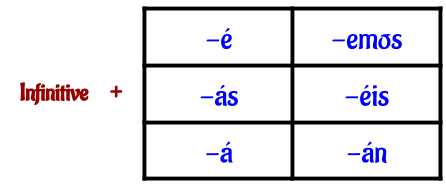El Futuro
Future tense is used to speak about events that will or are going to happen in the future. There are two ways to refer to future events.
(1) The immediate future can be formed by using the modal construction ir a + infinitive (to be going to....).
For example:
Yo voy a leer un libro. Ella va a venir mañana.
I am going to read a book. She is going to come tomorrow.
(2) The general reference to the future is typically preceded by the helping verb will, almost as if it were a solid commitment one is making about the action. In general, we may use the Spanish future where the future is used in English.
The future tense is formed by using the infinitive form of the verb and adding the appropriate ending at the end of the infinitive.
- The immediate future
- Simple future actions
(1) The immediate future can be formed by using the modal construction ir a + infinitive (to be going to....).
For example:
Yo voy a leer un libro. Ella va a venir mañana.
I am going to read a book. She is going to come tomorrow.
(2) The general reference to the future is typically preceded by the helping verb will, almost as if it were a solid commitment one is making about the action. In general, we may use the Spanish future where the future is used in English.
The future tense is formed by using the infinitive form of the verb and adding the appropriate ending at the end of the infinitive.
|
For example:
Yo hablaré con mi madre mañana. I will speak with my mother tomorrow. Nosotros viajaremos a Madrid en el verano. We will travel to Madrid in the summer. |
Here in the example, hablar is the infinitive (meaning to speak/talk) but as soon as we add the appropriate verb ending, it changes. As in the example, Yo hablaré, now means "I will speak/talk".
|
Irregular Verbs
There are some irregularities among the most common verbs. Several have modifications in the infinitive; two verbs use an old form of the infinitive. All verbs use the same endings as seen above.
Spanish future translates English will to indicate simple future action, but querer is needed to show willingness.
¿Me ayudarás?
Will you help me? (Are you going to help me)
¿Quieres ayudarme?
Will you help me? (Are you willing to help me?)
¿Me ayudarás?
Will you help me? (Are you going to help me)
¿Quieres ayudarme?
Will you help me? (Are you willing to help me?)
Below is a website, Conjuguemos.com, where you can practice the conjugations.


